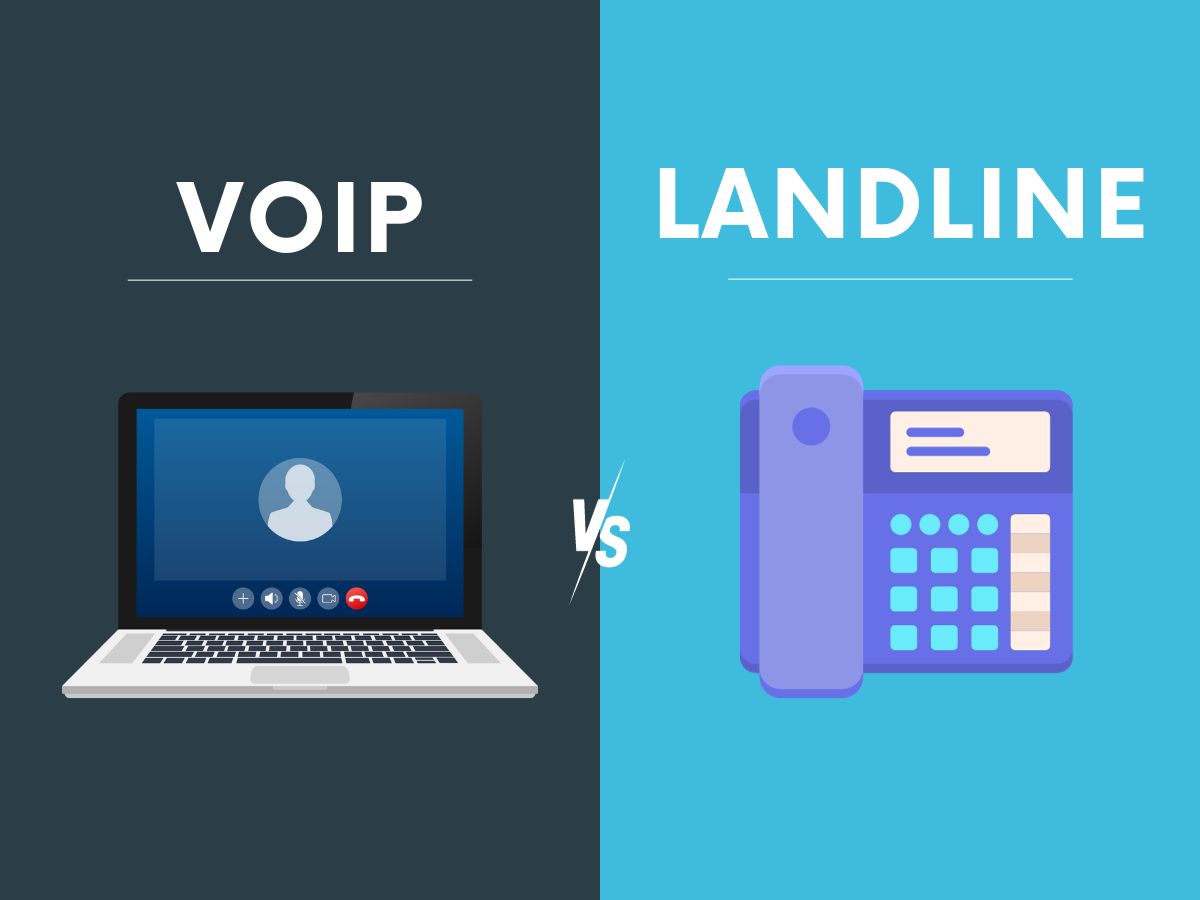In today’s business landscape, companies are confronted with fundamental decisions that impact their efficiency, productivity, and competitiveness. One of the most crucial choices is selecting the communication technology they will use. Telephony is an essential part of any business, and the decision between VoIP and landline significantly impacts how organizations communicate, collaborate, and operate.
In this post, we will comprehensively compare VoIP and landline, two different approaches to business communications. We’ll analyze the features, advantages, and disadvantages of each, providing a robust guide for businesses to make informed decisions based on their specific needs.
VoIP: What it is and how it works
Voice over Internet Protocol (VoIP) technology has revolutionized how businesses communicate in the digital era. VoIP, instead of relying on traditional phone lines, transmits voice and data over internet connections.
Here’s a detailed explanation of how it works:
- Voice Digitalization: Instead of transmitting analog signals over phone lines, VoIP converts voice into digital data. This is achieved through codecs (audio compression and decompression) that turn sound waves into digital data packets.
- Transmission Over the Internet: Once the voice is converted into digital data, these packets are transmitted through the Internet infrastructure. This enables voice transmission over IP networks, including local and public networks.
- Routing and Reception: Digital data packets travel through the network until they reach the desired destination. At the receiving end, the packets are converted back into audio signals the recipient can hear.
- Integration of Data and Voice: One standout feature of VoIP is its ability to integrate voice and data on a single network. This means businesses can conduct phone calls while sharing documents, engaging in video conferences, and using other communication applications, all within the same infrastructure.
Advantages of VoIP for businesses
The adoption of VoIP offers numerous advantages for businesses, including:
Cost savings
VoIP is often more cost-effective than traditional landline telephony. Calls between company branches and long-distance calls are frequently more economical or even free.
Flexibility
VoIP allows businesses to tailor their communication systems according to their needs. It is scalable and easy to manage, facilitating the expansion or contraction of phone lines as necessary.
Advanced features
VoIP provides a wide range of advanced features, such as video conferencing, call waiting, call forwarding, and visual voicemail, which can enhance business efficiency.
Mobility
Employees can access their VoIP lines from anywhere with an internet connection, improving mobility and collaboration.
Integration with business software
VoIP easily integrates with other business applications, such as Customer Relationship Management (CRM) systems and collaboration tools.
Common use cases of VoIP in the business environment
VoIP technology has transformed the way businesses communicate and has proven to be a versatile and cost-effective option for a wide variety of business applications:
- Customer service centers: Companies use VoIP to manage customer calls efficiently, incorporating call recording and intelligent routing features.
- Telecommuting: VoIP enables employees to work from home or any remote location while maintaining the same communication quality as in the office.
- Business collaboration: Video conferencing and conference calls are essential for collaboration and decision-making.
- Global offices: Businesses with offices worldwide can leverage VoIP for more affordable and effective international communications.
- Cost savings: The ability to make long-distance and international calls at a reduced cost is crucial for many businesses.
Fixed-line telephony: features and limitations
Fixed-line telephony, or landline or wired telephone, refers to the traditional telephone communication system that utilizes physical cables to transmit voice and data signals between users.
Description of conventional fixed-line telephony
These fixed lines are typically provided by telecommunications companies and are connected to the Public Switched Telephone Network (PSTN).
Some key characteristics of conventional fixed-line telephony include:
- Physical connection: In a fixed-line telephony system, communication is established through copper or fiber optic cables connecting the user’s phone to a local telephone exchange.
- Stable voice quality: Fixed-line telephony provides stable and reliable voice quality, with minimal signal degradation and a low likelihood of interruptions.
- Static location: Landline phones are tied to a physical location, meaning users can only call from their installation site.
- Limitations in advanced features: Unlike VoIP, traditional fixed-line telephony tends to offer a limited set of advanced features, such as voicemail and caller ID.
PSTN operators are taking a decisive step towards innovation by migrating to packet switching or Voice over IP. Traditional ISDN or analog lines are no longer part of their offerings, replaced by a more modern and versatile solution.
The current trend is that, instead of offering conventional lines, operators choose to deploy Internet routers. These devices allow the connection of phones, which can be either IP or analog. It’s common to find routers with IP-to-analog converters, facilitating the transition and the continued use of existing terminals in homes and offices.
It will likely adopt VoIP technology when activating a new telephone line in your office or home. However, it’s important to note that, despite the benefits offered by this technology, some operators may limit certain functionalities, such as roaming, advanced features, and business collaboration. Additionally, associated costs could remain at levels similar to conventional services.
Limitations and challenges facing fixed lines today
While conventional fixed-line telephony is renowned for its stable voice quality, it encounters cost challenges, mobility, integration, and flexibility in a business environment that demands more agile and versatile communication. These limitations have led to an increased adoption of VoIP solutions in many companies.
- Higher costs: Installing and maintaining fixed lines can be costly for businesses, especially when compared to VoIP solutions that leverage existing Internet infrastructure.
- Lack of mobility: Fixed-line telephony is confined to specific locations and does not allow employee mobility. This can be inconvenient in an increasingly global and flexible business environment.
- Limited integration capability: Fixed-line telephony cannot seamlessly integrate with other business applications, hindering collaboration and efficiency.
- Constraints in expansion and flexibility: Adding new fixed lines or modifying the infrastructure can be cumbersome and expensive, limiting a company’s ability to adapt to changing communication needs.
- Dependency on legacy infrastructure: Fixed lines rely on physical network infrastructure that requires constant maintenance. Disruptions due to natural disasters or technical issues can significantly impact communication.
Cost and efficiency comparison: VoIP vs. fixed-line telephony
Cost analysis and efficiency comparison underscore the potential cost savings and operational benefits VoIP can bring businesses, particularly regarding flexibility, scalability, and integrated communication services. However, the choice between VoIP and fixed-line telephony should be based on the specific needs and circumstances of the company.
Efficiency and potential savings for businesses
- Flexibility and mobility:
- VoIP: VoIP enables greater flexibility, as employees can make and receive calls from anywhere with an internet connection, promoting remote work and business continuity.
- Fixed-line telephony: Fixed lines are tied to specific locations, limiting employee flexibility and hindering adaptability for businesses with mobile workforce needs.
- Integrated services:
- VoIP: VoIP often integrates voice communication with other digital services, providing a unified communication platform that enhances collaboration and efficiency.
- Fixed-line telephony: Traditional fixed-line systems may lack integration capabilities, requiring separate solutions for different communication needs.
- Operational efficiency:
- VoIP: VoIP systems offer features such as voicemail to email, call forwarding, and virtual receptionists, streamlining communication processes and improving operational efficiency.
- Fixed-line telephony: While fixed-line systems provide essential communication functions, they may need advanced features contributing to operational efficiency.
- Adaptability to business changes:
- VoIP: VoIP easily adapts to changes in business size and structure, allowing quick adjustments to communication needs without significant infrastructure changes.
- Fixed-line telephony: Traditional fixed-line systems may pose challenges in adapting to changes, requiring significant investments and time-consuming adjustments.
Sound quality and reliability of VoIP vs landline telephony
Regarding sound quality, both VoIP and landline telephony can provide satisfactory auditory experiences, depending on available infrastructure and specific business needs.
Regarding reliability, both options have a solid track record, but businesses should assess the reliance on physical infrastructure versus dependence on a stable internet connection. Redundancy is key to mitigating potential interruptions, and companies can implement strategies tailored to their requirements to ensure communication continuity, whether through VoIP or fixed-line telephony.
Assessment of sound quality in VoIP
- Advantages in sound quality: VoIP technology has advanced significantly, offering sound quality comparable to fixed-line telephony. With a stable internet connection and efficient codecs, VoIP calls can provide clarity and sharpness in voice transmission.
- Influencing factors: Sound quality in VoIP may be affected by internet connection speed, network congestion, and equipment configuration. However, these issues are mitigated with improvements in network infrastructure.
Assessment of sound quality in fixed-line telephony
- Traditional stability: Fixed-line telephony has been historically recognized for its stability and sound quality. Using dedicated physical lines, conventional phone calls offer a reliable and consistent auditory experience.
- Technological limitations: Although traditional fixed-line telephony ensures stable sound quality, it may need advanced sound-enhancing features in VoIP solutions.
Considerations on reliability and redundancy in VoIP
- Reliability in constant improvement: As internet infrastructure improves, the reliability of VoIP calls has increased. However, it remains essential to have a reliable internet connection to ensure consistent performance.
- Redundancy options: VoIP solutions can implement redundancy strategies, such as intelligent call routing and diversification of internet service providers, to mitigate potential interruptions.
Considerations on reliability and redundancy in fixed-line telephony
- Traditional reliability: Fixed-line telephony has been known for its reliability over time. Since it uses dedicated physical cables, it is less susceptible to network congestion or external interferences.
- Dependency on physical infrastructure: Despite its reliability, fixed-line telephony may be affected by natural events or damage to physical infrastructure, which could result in interruptions.
Both options can benefit from redundancy strategies to ensure service continuity. This could include implementing backup systems, connecting to multiple service providers, or using failover technologies.
Security in communications: VoIP vs. fixed-line telephony
The choice between VoIP and fixed-line telephony will depend on a company’s specific security, scalability, and flexibility priorities. Both options offer security measures and distinct approaches to line management, and the final decision should be tailored to the particular needs of the company and its operational environment.
Security in VoIP
Security challenges: While VoIP calls are encrypted, transmission over the internet poses security challenges, such as the risk of interception and cyber attacks. Vulnerability to threats like call hijacking and phishing is also a concern.
Evolving security measures: VoIP solutions consistently implement new security measures, such as end-to-end encryption and multi-factor authentication, to address emerging threats.
Recommended security measures in VoIP
Data encryption: Implement end-to-end encryption to protect communications during transmission.
Firewalls and security filters: Use firewalls and security filters to prevent unauthorized access and attacks.
Updates and patches: Keep software updated with the latest security patches to address known vulnerabilities.
Security in fixed-line telephony
Traditional security: Traditional fixed-line telephony is considered more secure than VoIP calls, as it uses a physical and closed infrastructure. However, it has risks, such as line interception and unauthorized access to switching equipment.
Recommended security measures in fixed-line telephony:
Restricted physical access: Ensure that access to the physical infrastructure of fixed-line telephony is restricted to prevent unauthorized manipulations.
Line Monitoring: Implement monitoring systems to detect possible intrusions or line interceptions.
Scalability and flexibility of both systems
This brief overview will unravel the adaptability of these technologies, shedding light on their capacity to meet the evolving communication needs of businesses.
How scalability affects VoIP
- Advantages: VoIP is highly scalable, allowing businesses to add or reduce lines without significant physical infrastructure changes. It facilitates global expansion and efficient handling of large call volumes.
- Challenges: Scaling VoIP may require additional investments in bandwidth and technological upgrades to ensure optimal performance.
How scalability affects fixed-line telephony
- Advantages: Traditional fixed-line telephony may need to be more flexible regarding scalability, as expansion may involve installing new physical lines and equipment.
- Challenges: As a company grows, the scalability of fixed-line telephony can become a logistical and financial challenge.
How flexibility affects VoIP
- Advantages: VoIP offers flexibility in line and resource management, allowing businesses to adjust the number of lines according to changing needs easily.
- Benefits: Centralized management and real-time configuration options provide greater operational flexibility.
How flexibility affects fixed-line telephony
- Advantages: Although it may be less flexible, fixed-line telephony provides a more traditional and direct management of physical lines.
- Benefits: Some companies prefer the simplicity and stability of fixed-line telephony for managing their lines and resources.
Advanced features of VoIP
Discover the capabilities that set VoIP apart, giving businesses an insight into the enhanced tools and capabilities that redefine modern voice communication.
Integration with other business applications
The integration of VoIP with other applications brings a range of benefits to business communications, including:
- Enhanced collaboration
- Operational efficiency
- Improved customer service
- Adaptability
Explore some of the applications and functions that these integrations contribute to:
Integration with CRM
VoIP seamlessly integrates with Customer Relationship Management (CRM) systems. This allows employees to access relevant customer information during calls, enhancing customer service and relationship management efficiency.
Ticketing and support systems
Integration with ticketing and support systems enables businesses to track and efficiently manage customer inquiries. Relevant information is linked to calls, improving service quality and issue resolution.
Business collaboration tools
VoIP integrates with various business collaboration tools like project management platforms, file-sharing applications, and online collaborative environments. This creates an integrated ecosystem that boosts productivity and collaboration.
Productivity applications
VoIP can integrate with productivity applications, including online office suites and task management tools. This allows employees to access these applications directly from their communication system, optimizing operational efficiency.
Video conferencing
The ability to conduct video conferences is one of the standout features of VoIP. It enables businesses to hold virtual meetings, connecting geographically dispersed employees and facilitating real-time collaboration.
Unified messaging
VoIP provides unified messaging systems integrating emails, voicemails, chat, and other communication services. This simplifies message management and enhances the efficiency of internal communication.
Online conferencing
VoIP makes online conferencing easy, allowing businesses to organize virtual events, presentations, and webinars. This optimizes collaboration and communication with customers, partners, and employees.
Smart call forwarding
Advanced call forwarding options enable businesses to manage calls efficiently. They can be automatically directed to specific employees, departments, or locations based on needs and availability.
VoIP vs. landline: considerations for choosing the best option
The choice between VoIP and landline should be based on a comprehensive assessment of the business’s specific needs.
When evaluating options, it’s essential to consider not only the current state of the business but also its long-term vision and ability to adapt to changes in the business and technological environment.
Here are some considerations before choosing a phone system.
Company size
Smaller businesses may benefit from the flexibility and reduced costs of VoIP solutions. Larger enterprises with established phone infrastructures may find traditional landlines still a viable option.
Communication needs
Evaluate the specific communication needs of the company, including video conferencing, unified messaging, and online conferences. VoIP provides a broader range of advanced features that can be crucial for some businesses.
Budget
Compare total ownership costs, including installation, maintenance, and monthly fees. While VoIP is often more cost-effective, companies should consider the initial investment and long-term costs.
Scalability
Assess the solution’s ability to grow with the company. VoIP generally offers greater scalability without the need for significant infrastructure changes.
Flexibility
Consider operational flexibility. VoIP allows greater mobility and access to lines from anywhere with an internet connection, which can be crucial in modern business environments.
FAQs
What are the main differences between VoIP and landline for businesses?
The main difference lies in the technology used. VoIP transmits calls over the internet, offering flexibility and advanced features. Landline uses physical cables, which are known for stability but may lack some modern functions.
Is landline still relevant in the digital age?
Yes, landline remains relevant for some businesses, offering stability and sound quality, preferred by those with established infrastructure and basic communication needs.
How does sound quality in VoIP compare to landline?
A stable internet connection makes VoIP sound quality comparable to a landline. However, quality may vary based on connection speed and other factors. Landline is known for stability in this aspect.
Is VoIP more vulnerable to security issues than landlines?
VoIP can be more vulnerable to cyber threats, but security measures like encryption and authenticat





